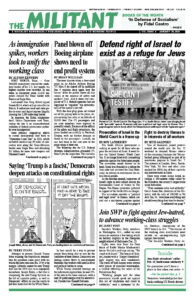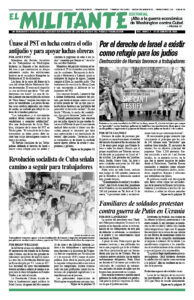WASHINGTON — “We seek to preserve the economic and social transformation of Cuba today. To protect the rights of the Cuban people in a world more difficult and more dangerous than 1959,” Alejandro García del Toro, deputy chief of Mission from the Cuban Embassy, said at a Jan. 6 Militant Labor Forum sponsored by the Socialist Workers Party here to celebrate the 65th anniversary of Cuban Revolution.
“We defend rights that the political system in the United States is unable to provide, that are still waiting for solutions in poor communities, such as health care and education,” he said.
Fidel Castro and the Rebel Army led the Cuban people to overthrow the U.S.-backed Fulgencio Batista dictatorship in January 1959, opening the road for workers and farmers to carry out a socialist revolution and begin building a new society in Cuba.
“The sanctions and measures against Cuba put in place by Donald Trump are still in place. President Biden continues those policies,” García del Toro said. “The consequences impact the daily life of the Cuban people.
“It is important to celebrate this occasion tonight as we say ‘End the blockade of Cuba,’ and ‘Remove Cuba from the State Sponsors of Terrorism list.’”
García del Toro was joined on the platform by Arrin Hawkins, organizer of the Socialist Workers Party branch here. “This past year, tens of thousands of autoworkers, bakery and hotel workers, dockworkers and more, participated in strikes and labor actions in the U.S. that showed a confidence and a willingness to fight.
“None of this is a prediction of success, but it shows that the decades-long rout of the labor movement — where few strikes happened, and with more defeats then wins — is behind us,” said Hawkins, who is a member of Bakery, Confectionery, Tobacco Workers and Grain Millers Local 68 in Baltimore. “It points to the growing confidence and unity of the working class.”
“Fidel Castro and the Cuban leadership understood, as Lenin and the Bolsheviks before him, that to have a genuine revolution — to overthrow capitalist class relations and put power in the hands of the working class — you need a communist leadership,” she said. “And it meant mobilizing and leading millions into revolutionary action.
“The lessons of the Cuban Revolution are decisive, all the more so in face of the watershed events of world politics today,” Hawkins said, pointing to Moscow’s war to destroy Ukraine and its people, and the counterrevolutionary regime in Tehran working with Hamas to carry out the Oct. 7 pogrom against Israel and Jews.
Hawkins described how workers, farmers and youth in Cuba are commemorating the anniversary of the Freedom Caravan held after the victory of the revolution. Fidel Castro led the caravan as it traveled across Cuba from Santiago to Havana in the first days of January 1959. Hundreds of thousands of working people turned out to meet and hear from Castro and “the bearded ones” in cities and towns along the route.
Raúl Castro Ruz, the leader of Cuba’s revolutionary armed forces, and Cuban President Miguel Diáz-Canel commemorated the 65th anniversary Jan. 1 in Céspedes Park in Santiago. Raúl Castro recounted what Fidel Castro said as they began the caravan to Havana: “The revolution begins now. It will not be an easy task; it will be a hard enterprise full of dangers. And yet, there is still much to be done.”
“The victorious socialist revolution in Cuba, made possible by workers and farmers under the leadership of Fidel, gives us a living example we can learn from, defend and most importantly, fight to emulate,” Hawkins said.
Joining in the celebration were representatives from the Cuban Embassy, SWP members and supporters and others looking to learn more about the Cuban Revolution. The presentations were followed by a lively discussion and a spread of food and refreshments.
The challenges facing Cuba today in confronting the U.S. embargo and the unwillingness of the U.S. government to respond to recent physical attacks on the Cuban Embassy here, were among the issues discussed.

